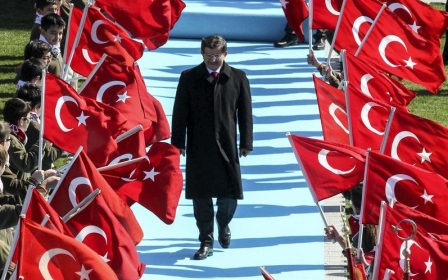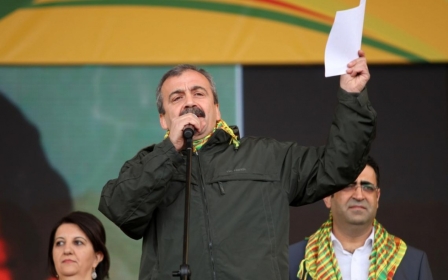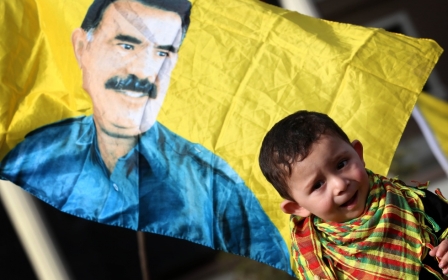Turkey launches operation against PKK as peace process struggles

The Turkish military has launched an operation against Kurdistan Workers Party (PKK) hideouts in the southeast of the country, according to a statement on the army website.
Five military teams were sent to the Mazzıdagi district in Southeast Anatolia on Tuesday with the aim of destroying stores and shelters belonging to the PKK.
"Security forces are conducting an operation with five teams with the aim of identifying and destroying shelters and stores believed to belong to the separatist terrorist group in the Mazıdagi countryside of Mardin," the military said.
The operation comes at a tense time for Turkey-PKK relations.
On Monday, Turkish President Recep Tayyip Erdogan warned that the PKK would need to lay down their arms before negotiations could continue.
“Peace is not possible under the shadow of arms,” he said during a meeting with local community representatives.
“We cannot move forward in an environment in which promises are violated repeatedly unless we see concrete steps.”
He also added that, with just over two months to go until an election, he didn’t believe that voters should have to go to the ballot box with the threat of PKK violence hanging over them.
Fighting has also broken out within the ruling Justice and Development party (AKP) over the terms of the negotiations, leading to a very public spat between the deputy Prime Minister Bulent Arinc and mayor of Ankara Melih Gokcek.
During Newruz celebrations at the weekend, a message from the PKK's imprisoned leader Abdullah Ocalan was read out in which he called for an end to the PKK's armed conflict.
“The crisis caused by neoliberal policies imposed on the whole world by imperialist capitalism and its despotic local collaborators is affecting our region and country,” said the statement.
“In this environment of crisis, ethnic and religious variations among our people and within our cultures are being erased by meaningless and brutal identity wars."
He described ending the armed struggle as a “historically necessary”.
“The day has come to terminate this brutal and disastrous assault, and to change over to the fraternity and democracy befitting our past,” he added.
“In my belief, it is necessary to facilitate open democratic identities in order to bring a democratic solution to the problem of confrontational, exhausting and disastrous nationalism on which nation states depend.”
But there have been mixed messages from other leaders of the PKK.
“What leader Ocalan said is not something new,” said PKK co-founder Cemil Bayik in an interview with al-Jazeera.
“Since 1993 the PKK has been developing unilateral steps for ending the armed struggle.”
Though he emphasised their commitment to a political process, he said the PKK would not be defenceless.
“We are not laying down arms…laying down arms and solving the problem through armed struggle are two different issues.”
While the AKP were the first government to initiate peace negotiations with the PKK, events in recent years have served to undermine many of the achievements.
In particular, the war in Syria and the rise of the Islamic State (IS) has been a major factor in a breakdown in relations.
The IS assault on the Syrian border town of Kobane – located in the Syrian Kurdistan region known as Rojava – provoked protest in the streets of Turkey after border guards prevented Turkish Kurds from travelling across the border to aid the People Protection Units (YPG).
Street demonstrations and in-fighting eventually led to over 50 deaths with Ocalan warning that the fall of Kobane would lead to the end of the peace process.
Since the PKK began their armed struggle against the Turkish state in 1984, more than 40,000 people have been killed in the conflict.
Atrocities have been committed on both sides – the PKK have been accused of suicide bombings, torture, execution of dissidents and using child soldiers, while the Turkish army’s actions against Kurdish villages and suspected PKK strongholds have been condemned as indiscriminate.
Turkish nationalists have historically been intensely hostile to any concessions to Kurdish nationalism and the PKK, and some analysts have predicted that in the run-up to the election, the AKP may be more reluctant to appear soft on the PKK.
“As the campaign heats up, both the AKP and the (pro-Kurdish People’s Democratic Party) HDP will likely try to claim the title of the party more committed to a negotiated agreement,” said Burcu Ozcelik, writing for the Carnegia Endowment for International Peace.
“But afraid of losing the nationalist vote, the AKP will avoid making significant concessions to either the HDP or PKK, making it even less likely the latter will agree to disarm.”
Middle East Eye propose une couverture et une analyse indépendantes et incomparables du Moyen-Orient, de l’Afrique du Nord et d’autres régions du monde. Pour en savoir plus sur la reprise de ce contenu et les frais qui s’appliquent, veuillez remplir ce formulaire [en anglais]. Pour en savoir plus sur MEE, cliquez ici [en anglais].




